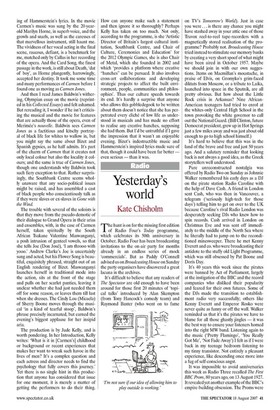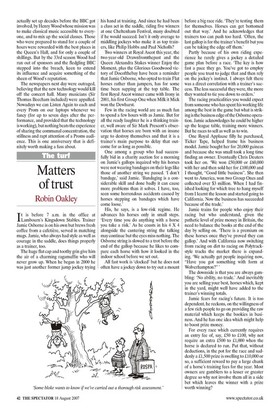Yesterday's world
Kate Chisholm The hunt is on for the missing first edition of Radio Four's Today programme, which celebrates its 50th anniversary in October. Radio Four has been broadcasting invitations to the on-air party for months already in an endless series of mock 'commercials'. But as Paddy O'Connell advised us on Broadcasting House on Sunday the party organisers have discovered a great lacuna in the archives.
It's difficult to believe that any readers of The Spectator are old enough to have been around for those first 20 minutes of 'topical talks' introduced by Alan Skempton (from Tony Hancock's comedy team) and Raymond Baxter (who went on to fame on TV's Tomorrow's World). Just in case you were ... is there any chance you might have stashed away in your attic one of those Truvox reel-to-reel tape-recorders with a magnetically stored realisation of the programme? Probably not. Broadcasting House tried instead to stimulate our memory banks by creating a very short spoof of what might have been aired in October 1957. Maybe we should join in with our own suggestions. Items on Macmillan's moustache, in praise of Elvis, on Gromyko's grim-faced diktats from Moscow, or a tribute to Laika, launched into space in the Sputnik, are all pretty obvious. But how about the Little Rock crisis in Arkansas? Nine AfricanAmerican teenagers had tried to enrol at the whites-only Central High School in the town provoking the white governor to call out the National Guard. (Bill Clinton, future Democrat president, grew up in Hot Springs just a few miles away and was just about old enough to go to high school himself.) It's hard to believe that this was in the land of the brave and free and just 50 years ago. And a salutary reminder that looking back is not always a good idea, as the Greek storytellers well understood.
Pure unreconstructed nostalgia was offered by Radio Two on Sunday as Johnnie Walker remembered his early days as a DJ on the pirate station Radio Caroline with the help of Dave Cash. A friend in London sent Cash, who was then in Vancouver, a telegram (seriously high-tech for those days') telling him to get on over to the UK because Caroline's rival Radio London was desperately seeking DJs who knew how to spin records. Cash arrived in London on Christmas Eve and was sent off immediately to the middle of the North Sea where he literally had to jump on to the reconditioned minesweeper. There he met Kenny Everett and co. who were broadcasting their antidote to the stuffy old Light Programme, which was still obsessed by Pat Boone and Doris Day.
It's 40 years this week since the pirates were banned by Act of Parliament, largely at the instigation of the BBC and the record companies who disliked their popularity and feared for their own futures. Some of the DJs made the transition to establishment radio very successfully; others like Kenny Everett and Emperor Rosko were never quite as funny or off the wall. Walker reminded us that it's the pirates we have to blame for all those ghastly jingles — it was the best way to ensure your listeners homed into the right MW band. Listening again to the music (Pretty Flamingo', 'You Really Got Me', 'Not Fade Away') I felt as if I were back in my teenage bedroom listening to my tinny transistor. Not entirely a pleasant experience, like descending once more into a fug of self-conscious angst.
It was impossible to avoid anniversaries this week as Radio Three recalled The First BBC Prom, 80 years ago, on 13 August 1927. It revealed yet another example of the BBC's empire-building obsession. The Proms were actually set up decades before the BBC got involved, by Henry Wood whose mission was to make classical music accessible to everyone, and to mix up the social classes. Those who were prepared to stand for a couple of hours were rewarded with the best places in the Queen's Hall, and for only a couple of shillings. But by the 33rd season Wood had run out of sponsors and the fledgling BBC stepped into the breach, keen to extend its influence and acquire something of the sheen of Wood's reputation.
The newspapers next day were outraged, believing that the new technology would kill off the concert hall. Many musicians (Sir Thomas Beecham included) were appalled. Nowadays we can Listen Again to each and every Prom on our laptops whenever we fancy (for up to seven days after the performance, and provided that the technology is working), but nothing beats the experience of sharing the communal concentration, the stillness and rapt attention of a Proms audience. This is one anniversary that is definitely worth making a fuss about.













































 Previous page
Previous page